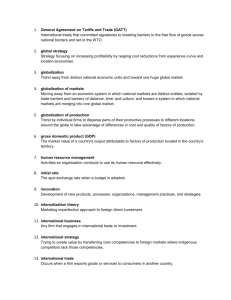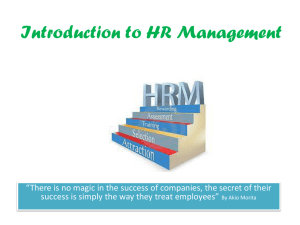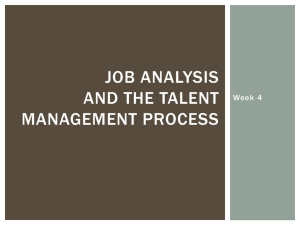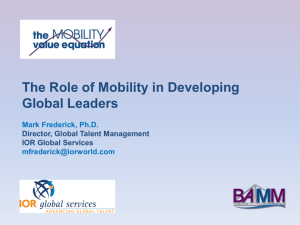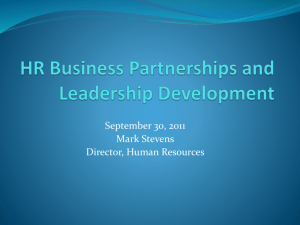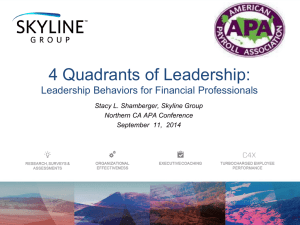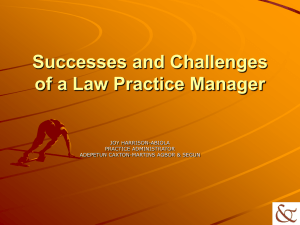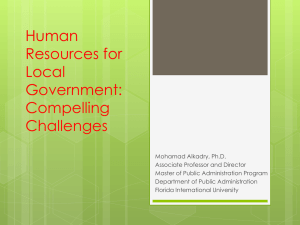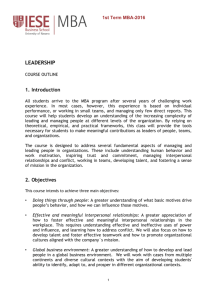Law Schools and 21st Century Practice
advertisement
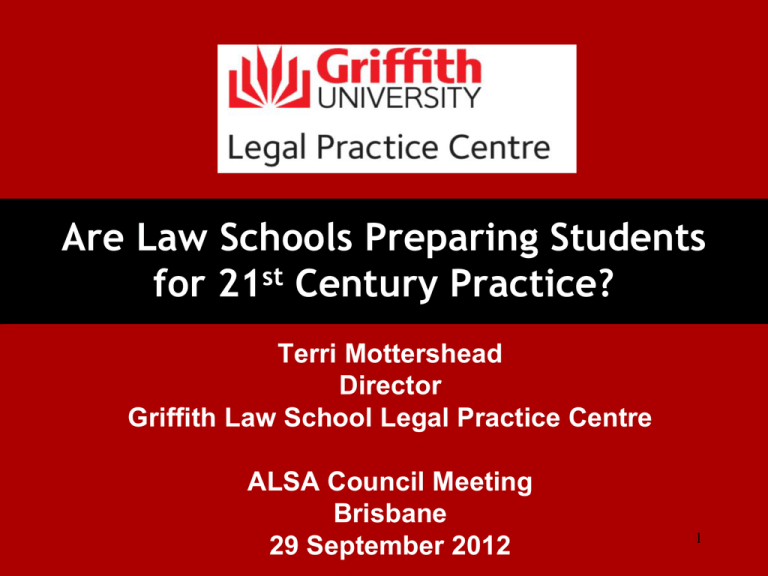
Are Law Schools Preparing Students for 21st Century Practice? Terri Mottershead Director Griffith Law School Legal Practice Centre ALSA Council Meeting Brisbane 29 September 2012 1 Agenda The “New Normal” Legal Industry Impact on Law Firms Impact on Law Schools What Does the Future Hold? Some Thoughts to End… 2 The “New” Normal Legal Industry Drivers of Change Globalization has changed the leadership, management and business of 5 law firms Technology has changed the type of work lawyers do, how the work is done and who does the work? 6 Corporate counsel have become legal industry change agents 7 Impact of Change on Law Firms Breakdown of Law Firm Work (Circa 2011) High Low Price Sensitivity & Leverage Mission Critical (10%) Ordinary Course of Business (40%) Value Focus Commodity (50%) High Low Source: Jordon Furlong, The rise of the super-boutique, August 19, 2011 9 Hildebrandt Baker Robbins, Process Management and Process Improvement Workshop (June 2010) USA: Source: Citi/Hildebrandt 2012 Client Advisory as in 10 Adam Smith, Esq, Growth Is Dead: Part 2 (September 10, 2012) 11 The classic business formula: Income – Expenses = Profit 12 Income Billable work Increase by raising rates Increase by work volume but Rate increases minimal, flat or decreasing DIFFERENTIATE & INNOVATE but More work staying in-house or going to LPOs 13 Expenses NEW People Premises Retention Highly skilled Highly motivated Focus on top performers Top performers most highly remunerated and most quickly promoted • Composite workforce • • • • • Turnover costs Lack of skills cost Lack of engagement costs Absence of feedback costs Mismatch of work to experience level costs • Focus on remedial action costs • Lockstep remuneration favors mediocrity • Up or out model costs • • • • • • Renegotiation? • Fixed versus remote? • Location? • Relocation of support services? • Outsourcing support services? • • DATA TO MEASURE, MANAGE, ANALYZE & IMPROVE FOCUS ON EFFICIENCY & INNOVATION 14 15 Business and Staffing Model Combinations Tweaking the Status Quo Business Model Staffing Model Pyramid model Partnership track (the Reverse pyramid Of Counsel Diamond main career path but also alternative career paths) Professional Managers but lawyers still very involved Growth/succession planning by: Lateral hiring Merger Globalization 16 Business and Staffing Model Combinations Staffing Model Alternative Business Structures Distinctive mix or sole focus on: Mission critical work Specialist (“boutique”) work Commoditized work (LPO) Lawyers focus on legal work and professional managers administer (proactive mgt) Emphasis on using technology Multiple career paths Contract lawyers Flexible work arrangements Growth/succession planning by recruiting and retaining people based on work to be performed Globalization through law firm alliances 17 AUSTRALIA 18 AUSTRALIA 19 UK 20 USA 21 Competencies and Career Paths Law Firm Competency Based Development Models Same model but different outcomes for different career paths Career Path Competency Model Career Path 23 Typical Law Firm Competencies (Partnership Track Associates) Legal writing and research Legal knowledge Leadership Ethics and professional responsibility Problem solving Community service • • • • • • • • Project Management Team building NEW Client service Relationship building/networking Self awareness Adaptability/flexibility/ innovation/creativity Communication Ownership and accountability Usually number around 8-16 24 FRAMEWORK: Law Firm Talent Management (Integrated Competency-Based Development Model) Recruitment (Talent Inflow) Learning (Training) Programs Work Experience (Work Assignment) Pro Competencies Bono Benchmarks Career Planning & Development: Coaching Mentoring Counseling Evaluation Ongoing Feedback: Succession Planning (Talent Outflow) Promotion Compensation Talent Development (Retention!) 25 The Impact of Change on Law Schools Changes: Law Schools Mirror Law Firms Law Firms Law Schools Governance Leadership Competencies Talent Management Curricula Teaching Skills Competencies Governance Leadership Practical, Practical, Practical 27 Stanford Law School 28 Emphasis on learning by doing (“multi-dimensional JD”) Coursera 29 What Does the Future Hold? USA 31 Source: Adam Smith, Esq, Growth Is Dead: Part 2 (September 10, 2012) Emerging Trends in Recruitment in the “New” Normal Recruiting for new/different competencies Laterals versus new hires Must be able to “hit the ground running” Leveraging Gen Y flexibility/mobility/techno-savvy/work/life balance focus Target recruitment on bringing the talent “back home” and being a place to learn more, faster Managing for mobility 32 Some Thoughts To End… What got law firms and law schools here, will not get them there! 34 35 Diversity 36 Questions? 37 Thank You 38
